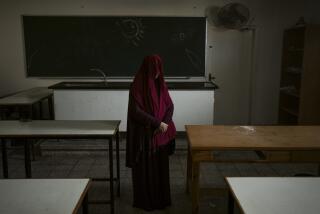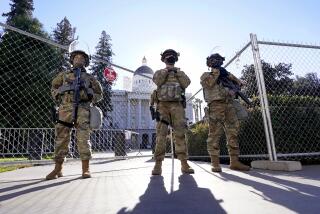Improper Handling of Koran Confirmed
- Share via
WASHINGTON — A military investigation has found that U.S. troops mishandled Korans of Muslim prisoners five times at Guantanamo Bay, Cuba, but found “no credible evidence” to support a detainee’s claim that a holy book was flushed down a toilet, the prison’s commander said Thursday.
The investigation looked into 13 allegations that the book had been treated improperly, and it determined that five incidents “could be broadly defined as mishandling” of a Koran, Army Brig. Gen. Jay Hood, the Guantanamo prison commander, told reporters at the Pentagon. Two people have been punished in connection with two incidents, said Hood, who was in charge of the inquiry.
Hood’s comments were the most detailed account to date of allegations that military guards and interrogators at the prison had mishandled Islam’s holy book. The investigation is continuing.
Pentagon officials said international furor over an allegation published in Newsweek that a guard had flushed a Koran down a toilet prompted them to brief reporters about the interim findings. The magazine report about the treatment of the Koran was widely blamed for touching off deadly riots in Afghanistan and Pakistan. Newsweek retracted the report one week after publishing it.
An FBI report released Wednesday summarized one detainee’s account of the incident in two interviews conducted in July 2002. (The report was released because of a lawsuit by the American Civil Liberties Union that sought to shed light on U.S. treatment of prisoners in Cuba.)
The guards “flushed a Koran in the toilet,” the detainee alleged, according to the FBI report. “The guards dance around when the detainees are trying to pray. The guards still do these things.”
That account differed from what the detainee told military investigators, Hood said.
Although the prisoner was never asked about the incident cited in the FBI document, Hood said, he was asked whether “he had seen the Koran defiled, desecrated or mishandled, and he allowed as how he hadn’t. But he had heard guards -- that guards at some other point in time had done this.
“I do not believe [the military investigators] used that word, ‘toilet,’” Hood said.
He said he could not explain why the detainee had told different stories to investigators from the military and the FBI, but he indicated that the wording might have been inexact.
Pentagon spokesman Lawrence DiRita said investigative accounts often amount to “second- and third-hand reports of hearsay.”
Hood declined to discuss specific incidents of alleged Koran desecration before completing the investigation. He also refused to detail how the two people were punished except to say that one had been reassigned.
Over the last 12 days, investigators reviewed 31,000 documents dating back three years, Hood said. They found 13 allegations that the Koran had been mishandled by U.S. troops.
In addition to finding the five incidents in which the Koran was mishandled, he said, the investigation found in six incidents that guards touched the holy book by accident or within the scope of their duties -- instances that were not considered abuse -- or did not touch it at all. In a 12th incident, an interrogator placed two Korans on a television set, which the Pentagon considered acceptable, and in a 13th, an interrogator stood over a Koran while questioning a detainee, which the investigators said was an accident.
Investigators found no pattern in the mishandling of the Korans, Hood said.
Of the five substantiated incidents of mishandling the book, four occurred before the military established guidelines for handling the Koran. Those rules were set out by Army Maj. Gen. Geoffrey Miller in January 2003 after the Red Cross alleged that soldiers were abusing the Koran. Miller was then commander of the prison at Guantanamo Bay.
In essence, those written guidelines say the books are generally to be handled only by Muslim chaplains working for the military, and guards are instructed not to touch the Koran unless absolutely necessary.
Muslims have rules for handling the Koran, which is revered as the word of God. Some Muslims hold that nonbelievers must not touch the holy book.
Hood’s report also found 15 cases in which detainees -- as opposed to military personnel -- mishandled the Koran, in one case ripping out pages.
“This is not a benign group of people,” Hood said. “These are enemy combatants that are detained because they represent a clear threat and danger to the United States and our allies.”
The Pentagon is conducting a separate internal investigation of reported abuses at the Guantanamo detention facility, led by Air Force Lt. Gen. Randall Schmidt. The administration has refused to say what that inquiry has found so far.
Whether accurate or not, the published allegation that a Koran had been flushed down a toilet has taken on a life of its own.
Gen. John P. Abizaid, who, as head of the U.S. Central Command, directs the wars in Iraq and Afghanistan, said in a recent interview with several reporters at the Pentagon that the Newsweek item had come at a critical time.
“I think it was a story that was exploited by many of the political groupings and insurgent actors on both sides of the Pakistan-Afghanistan border for their own political aims,” Abizaid said. “And so it came at a time when, I thought, probably the political constellations were about ripe to start something.”
One lawyer who has interviewed detainees at Guantanamo said a detainee told him that allegations of Koran mishandling had led to two hunger strikes there.
According to the lawyer, one detainee said he was taking part in a hunger strike because a Koran had fallen into a toilet while a detainee was being shackled.
The lawyer said it was not clear whether the Koran was deliberately put in the toilet or accidentally knocked in.
The attorney, who said the detainees told one another about the incident, said his confidence in the detainee’s story was “very high.” The attorney spoke on condition of anonymity because of lawyer-client privilege and because he said he was concerned that the volatile issue could affect his position or access to clients.
A second hunger strike began after a detainee found a profane phrase written on his Koran when he returned to his cell, the detainee said, according to the lawyer.
More to Read
Sign up for Essential California
The most important California stories and recommendations in your inbox every morning.
You may occasionally receive promotional content from the Los Angeles Times.










